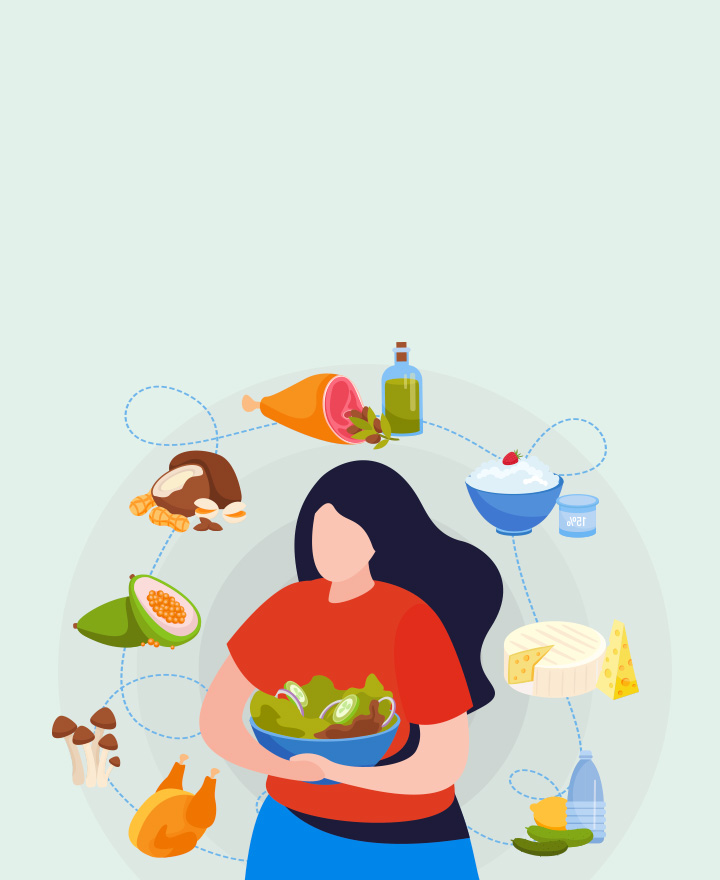

Dos and Don’t of Monsoon Diet
While monsoons beings relief from the scorching heat, it also increases the chances of falling prey to stomach infections and other ailments. Different types of stomach problems are prevalent during the monsoon season. Find out what foods you should consume and those you should avoid during this period to prevent stomach infections and flu-like symptoms. We will also discuss easy-to-follow preventive measures so you can enjoy the rainy season and stay away from its various ailments.
Foods to Eat During Monsoon
Although it’s difficult to avoid the lure of piping hot snacks in the rainy season, you must make healthy choices when it comes to picking the right food. Your dietary choices must include:
• Freshly Cooked Food
Avoid consuming food that has been kept for several hours to minimise the chances of contamination. It's better to opt for soups, stews, and fresh food.
• Herbal Teas
Drinking herbal teas with ingredients like ginger and peppermint can soothe your digestive system and help ward off stomach flu symptoms.
• Probiotics
Include probiotics like yoghurt and fermented foods in your diet. They promote healthy gut bacteria and can prevent stomach infections.
• Hydration
Drink boiled or filtered water to stay hydrated. Contaminated water is a common source of gastrointestinal infections.
Foods to Avoid During Monsoon
Certain foods can increase the risk of stomach infections during the monsoon season, so they are best to be avoided. Try to avoid:
• Street Food
Street foods are easily affordable, but most of them are prepared in an unsanitary environment. So, stay away from them to ward off stomach infections.
• Leafy Vegetables
Leafy greens like spinach and lettuce can harbour bacteria. Avoid them to reduce the risk of stomach flu symptoms.
• Raw Salads
Raw salads can easily get contaminated. Instead, it’s safer to consume the vegetables after they have been washed, cleaned, and cooked properly.
• Fried & Spicy Foods
Fried/oily and spicy foods usually cause heaviness in the stomach and may be hard to digest. Steer clear of them, say nutritionists, as they can wreak havoc on your digestive system.
Ways to Prevent Stomach Infections
Taking precautions can significantly lower the risk of stomach infections during the monsoon.
• Maintain Hygiene
Be sure to wash your hands often, particularly before eating. Proper hand washing can decrease the spread of germs.
• Clean Fruits and Vegetables thoroughly
Rinse fruits and vegetables properly before consuming them to eliminate germs or pesticide residue. They can also be soaked in salt water.
• Avoid Stagnant Water
Do not consume water or food that has been left open.
• Cook Thoroughly
Ensure that all food is cooked thoroughly, as it kills bacteria and makes food safer to consume.
• Store Food Properly
Store food in airtight containers to ensure that it remains fresh for a longer time and prevent contamination. Refrigerate leftovers promptly.
Conclusion
The monsoon season has its demerits, especially when it comes to eating healthy food. Following the above-listed dietary practices can prevent stomach infections and stomach flu symptoms. Wash your hands, eat healthily, and be merry while enjoying the rain without getting sick. If you still catch an infection, remember to seek medical advice for the right diagnosis and stomach flu treatment. Timely medical attention will help in quick recovery and prevent the symptoms from aggravating and turning into a complicated health issue.
One of the important components of our overall wellness is also being financially secured. Healthcare emergencies can happen any time, but a good health insurance policy can protect you from such uncertain situations. To know more about Wellness and other health related tips, visit the wellness corner.
Source: onlymyhealth.com, hindustantimes.com
Disclaimer: This blog provides general information and discussions about health and related subjects. The information and other content provided in this blog, website or in any linked materials are not intended and should not be considered, or used as a substitute for, medical advice, diagnosis or treatment. Kindly contact your Doctor before starting a new medicine or health regime.
Related Articles
Healthy Diet And Nutrition Plan For This Monsoon
Common Monsoon Diseases & Prevention
Diet tips for monsoon pregnancy
Pneumonia: Symptoms And Causes
Published on July 17, 2024














 Health Insurance
Health Insurance  Travel Insurance
Travel Insurance  Car Insurance
Car Insurance  Cyber Insurance
Cyber Insurance  Critical Illness Insurance
Critical Illness Insurance
 Pet Insurance
Pet Insurance
 Bike/Two Wheeler Insurance
Bike/Two Wheeler Insurance  Home Insurance
Home Insurance  Third Party Vehicle Ins.
Third Party Vehicle Ins.  Tractor Insurance
Tractor Insurance  Goods Carrying Vehicle Ins.
Goods Carrying Vehicle Ins.  Passenger Carrying Vehicle Ins.
Passenger Carrying Vehicle Ins.  Compulsory Personal Accident Insurance
Compulsory Personal Accident Insurance  Travel Insurance
Travel Insurance  Rural
Rural